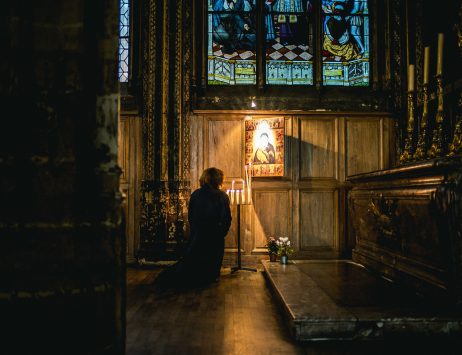I recently got into a heated discussion with my ten-year-old daughter about going to Mass. “I just don’t understand why we have to go all the time,” she complained to me. “It’s just sit, stand, kneel, stand, sit, kneel. I don’t see the point of it.” My response was less than persuasive. “It’s just really important,” I said. “It’s where we all come together to worship God and become part of the body of Christ.” “But it’s BORING!” she countered. When two of her younger siblings enthusiastically agreed, I knew I was in danger of being outmaneuvered. So, I said what parents have been saying from time immemorial. “It doesn’t matter. We’re going. It’s what we do.”
We went to Mass. My kids did what I told them to do. However, I was not satisfied, and neither were they. I don’t just want them to go to Mass “because I said so.” I want them to go to Mass because they truly want to go. Because they want to be nourished by the Scriptures, by the Eucharist, by Christ present in the community. In God’s own time, I trust that this desire will grow in them and they’ll find their own meaning in the liturgy. But until then, it’s “Because I said so.”
Spiritual Community is Obedience
Obedience is at the heart of St. Benedict’s vision of spiritual community. In the very second line of his Rule, Benedict tells the would-be monk, “The labor of obedience will bring you back to him from whom you had drifted through the sloth of disobedience.” This isn’t so surprising. After all, isn’t religion all about following the rules? But surely there must be more to it than that. Otherwise, we all end up like my kids, frustrated with how arbitrary and tedious it can all seem. Is this the essence of Benedict’s vision? A community of mere rule followers?
I just quoted the second line of the Rule of Saint Benedict, but it’s the first line that really gets to the heart of obedience: “Listen carefully, my son, to the master’s instructions, and attend to them with the ear of your heart. This is advice from a father who loves you; welcome it, and faithfully put it into practice.”
How to Listen With Your Heart
What distinguishes obedience from mere compliance? It’s what Benedict calls the “ear of the heart.” The Latin root of the word “obedience” is “ob-audire,” which means “to listen, to hear.” When we listen from the heart, we hear what really matters.
Obedience, in Benedictine spirituality, is an attitude, not just an action. When Benedict says, “Attend…with the ear of your heart,” he emphasizes that obedience begins with caring. Obedience begins with the assumption that we care deeply about living our lives to our fullest capacity and that we are willing to trust God to help us do it.
God speaks to us in many ways, one of which is through other people. So, obedience involves being willing to listen deeply for God in the voices of those around us, especially when they’re telling us things we don’t want to hear. This means listening to the people who have authority over us, like our bosses or other kinds of leaders. But for Benedict, obedience is not a one-way street. Obedience also means that superiors must listen for God in the voices of those who are under them. In Benedictine monasteries, there is just enough hierarchy to keep things orderly, but the emphasis is on a shared commitment to listening to God’s voice together, and God often speaks through the most unlikely people.
Listen Deeply for God’s Will
Ultimately, obedience in Benedictine spirituality is not about blindly following rules; it’s about listening deeply with the ear of your heart for God’s will. It’s about caring enough to listen for what really matters, even when it’s difficult or inconvenient. And it means not putting limits on who or where we might hear God.
As I reflect on my own experience with my children, I realize true obedience is not just about getting them to do what I say. It’s about nurturing within them a desire to seek God and find meaning in their lives. It’s about helping them listen for God’s voice and respond with love and compassion. It’s even about giving them the tools to disagree with me, to reason respectfully, and ultimately to make their own decisions.
So, the next time my daughter complains about going to Mass, I won’t just tell her “Because I said so.” Instead, I’ll encourage her to listen with the ear of her heart, to open herself up to the possibility of encountering God in the liturgy and in the community. I’ll commit to following up with her, to learn about her discoveries and to share my own insights. And who knows, maybe in turn I’ll learn something of God’s ways by listening to her.
In the end, obedience is not a burden but a gift. The vow of obedience says, “Listen!” It’s an invitation to live our lives with purpose and meaning, trusting that God is always guiding us along the way.




